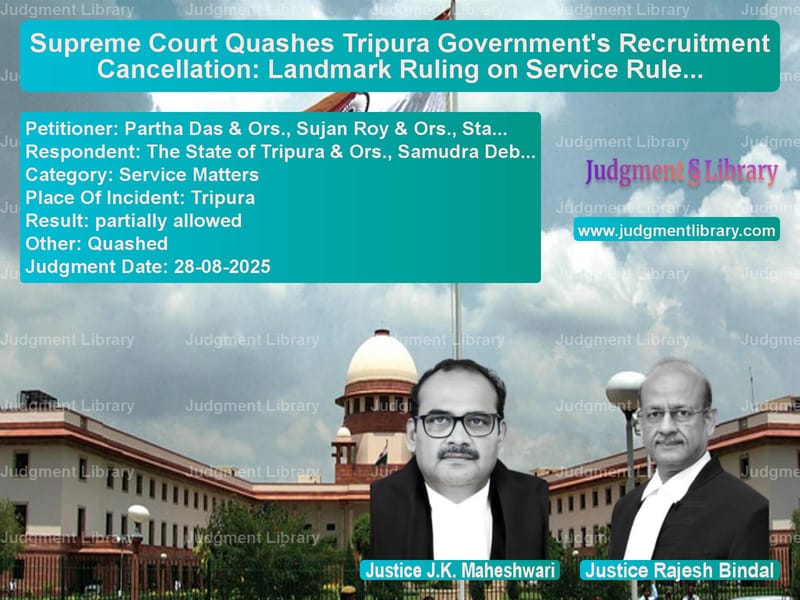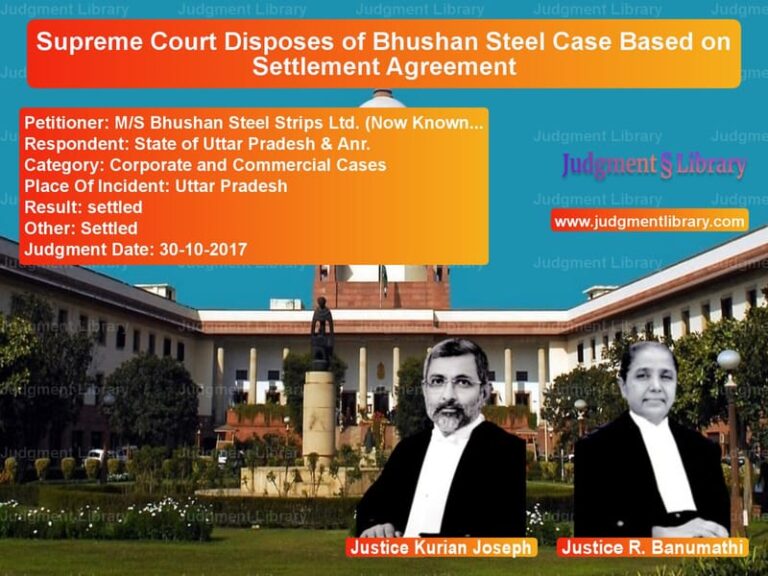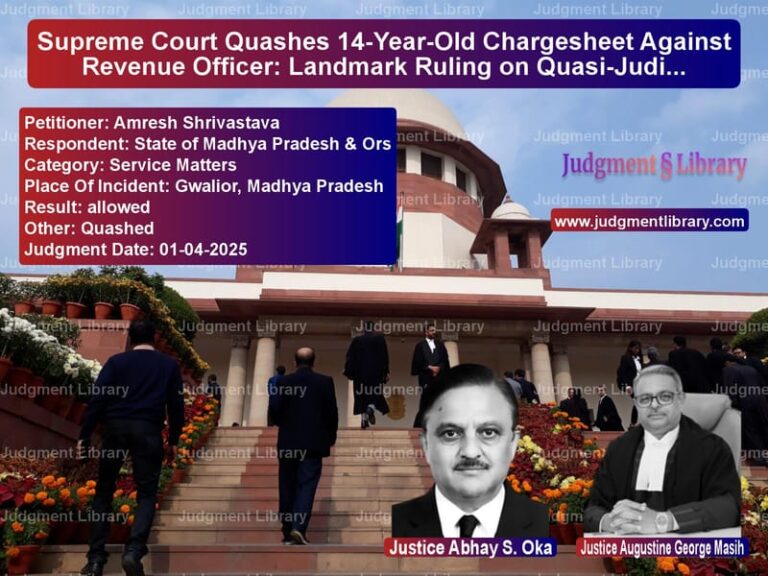Supreme Court Quashes Tripura Government’s Recruitment Cancellation: Landmark Ruling on Service Rules
In a landmark judgment that will significantly impact government recruitment processes across India, the Supreme Court delivered a comprehensive verdict on August 28, 2025, setting aside the Tripura government’s decision to cancel multiple ongoing recruitment processes. The case involved several batches of civil appeals concerning recruitment to various posts including Enrolled Followers in Tripura State Rifles, Tripura Civil Services, Tripura Police Services, and Inspector of Boilers. The court’s ruling establishes crucial principles about the relationship between statutory rules and executive policies, and the rights of candidates who participate in recruitment processes.
The legal battle began when the newly formed Tripura government in 2018 decided to review all ongoing recruitment processes. Through a series of memorandums, the government first put all recruitment in abeyance on March 14, 2018, then introduced a New Recruitment Policy on June 5, 2018, and finally cancelled all ongoing recruitment processes on August 20, 2018. This affected thousands of candidates who had already participated in various recruitment processes, some of which were at advanced stages. The affected candidates approached the courts, leading to this consolidated judgment from the Supreme Court.
The Legal Battle: Arguments from Both Sides
Mr. Pallav Shishodia, learned senior counsel appearing for the appellants, vehemently argued that the candidates had applied for the posts and participated in the selection process conducted under specific statutory rules. He contended that cancelling such selection processes in the wake of the New Recruitment Policy, without amending the relevant statutory rules, was arbitrary and illegal. He submitted that once a recruitment process begins, it cannot be changed midway by executive instructions. He also argued that as per Clause (2) of the New Recruitment Policy, its applicability was prospective, hence it could not be made applicable to pending recruitment processes.
Mr. Shishodia further contended that once a recruitment process is in progress under relevant statutes, no policy decision can stall or cancel the process. He argued that when the selection process was completed and appellants were selected provisionally, they had a legitimate expectation of appointment, which was not against public policy.
On the other side, Col. R. Balasubramanajan, learned senior counsel appearing for the State, vociferously contended that the High Court had rightly dismissed the writ petitions. He argued that the decision to cancel the ongoing recruitment process was taken consciously relying upon the New Recruitment Policy, which was within the competence of the State. The decision was taken with the intention to bring more transparency and fairness in the selection process. He contended that the recruitment process was still ongoing as no final merit list was published, and thus mere participation in the recruitment process would not confer any indefeasible right of appointment on the appellants.
The Court’s Comprehensive Legal Analysis
The Supreme Court, after examining the facts and legal provisions in detail, delivered a comprehensive judgment addressing multiple legal issues. The court first examined the status of the recruitment processes and found that in all cases, the processes were at advanced stages. For Enrolled Followers, selection lists had been prepared and character verification was in process. For TCS and TPS, the main examinations had been completed and only personality tests remained. For Inspector of Boilers, the interview had been conducted and only results remained to be declared.
The court then addressed the crucial question of whether executive instructions could override statutory rules. The court made several important observations: “Applying the above principles of law, it can safely be concluded that executive instructions issued under Article 166(1) of the Constitution of India cannot override the act done under the statute and the rules made thereunder. The executive instructions can only supplement the provisions of the act and the rules in case of any ambiguity or if gaps are to be filled but such executive instructions cannot supplant the specific provisions which already occupy the field.”
The court further elaborated: “It is not the case of the government that to fill the gaps and to supplement the TSR Act and TSR Rules, the NRP is relevant, therefore, Abeyance Memorandum or Cancellation Memorandum may be upheld. In absence of the same, in our view, the action of the government in cancelling the process of recruitment for the post of Enrolled Followers is not justified and would amount to arbitrary exercise of power.”
The court also examined whether the New Recruitment Policy could be applied retrospectively to ongoing recruitment processes. It noted: “It is further relevant to discuss that the pretext which has been taken to issue Cancellation Memorandum is NRP dated 05.06.2018. The said policy is based on the recommendation of the three-members review committee constituted by the State Government to review recruitment policy across the State and all its departments. The recommendations of the committee were plain and specific, inter-alia, observing that ‘all the above recommendations will be applicable with prospective effect only’.”
The Principle Against Changing Rules Midway
One of the most significant aspects of the judgment was the court’s firm stance against changing the rules of the game after the game has begun. The court observed: “The recruitment process under the two advertisements commenced on the date of their respective issuance. At the cost of repetition and as discussed above, much water had flown after such commencement. The State had taken active and tangible steps such as constituting the Recruitment Board, setting up different State teams for recruitment rallies which were conducted all across India, candidates were tested physically, in a written exam and orally through an interview. A provisional merit list was purportedly prepared in pursuance of the recruitment process. After all this, Cancellation Memorandum was issued on 20.08.2018 which was general in nature, effectively setting the clock back and putting the entire process at nought.”
The court relied on its earlier Constitution Bench decision in Tej Prakash Pathak case, noting: “This Court in Tej Prakash Pathak (Supra) has affirmed the decision in K. Manjusree vs. State of A.P. and Another, and held that the recruitment authority can devise a procedure for selection only in absence of rules to the contrary, however, the same should be done prior to commencement of the recruitment process. It has been held that if benchmarks are to be laid down in different steps of the recruitment process, they cannot be laid down after the completion of that particular step, when the game has already been played.”
Legitimate Expectation of Candidates
The court also addressed the important question of whether candidates had any legitimate expectation in the completion of the recruitment process. While acknowledging that candidates don’t have an indefeasible right to appointment, the court emphasized their legitimate expectation of fair process: “However, candidates who have taken part in a recruitment process conducted by a public authority have a legitimate expectation that the selection process will be conducted fairly and without arbitrariness. Consistency and predictability are important aspects of non-arbitrariness, and the rule of law obligates the State to only take decisions which are rooted in fairness and equality.”
The court further elaborated: “It was held in Sivanandan C.T. (Supra) and later clarified in Tej Prakash Pathak (Supra) that in order to frustrate the legitimate expectation of candidates the burden is on the State by placing relevant material to objectively demonstrate that the decision taken by it was in the larger public interest and not arbitrary.”
The court found that the State had failed to discharge this burden: “As discussed above, the State has failed to prove that the decision to apply NRP to the ongoing recruitment process was in the larger public interest – as such, the legitimate expectation of fairness in the recruitment process must be upheld.”
Court’s Final Ruling and Directions
After comprehensive analysis, the court allowed the appeals concerning Enrolled Followers and dismissed the State’s appeals concerning TCS, TPS, and Inspector of Boilers. The court set aside the impugned judgment of the High Court in the Enrolled Followers case and quashed the Abeyance Memorandum dated March 14, 2018 and Cancellation Memorandum dated August 20, 2018 insofar as they applied to the recruitment process for Enrolled Followers.
The court directed: “It is further directed that the recruitment process for the post of Enrolled Followers in Tripura State Rifles shall now be finalized and completed by the Respondents following the provisions of TSR Act and TSR Rules within a period of two months.”
For TCS and TPS recruitments, the court maintained the High Court’s directions and ordered: “It is directed that the process of recruitment for TCS and TPS Grade-II shall now be finalized and completed by declaring the results of the main examination and conducting personality test following the provisions of the TCS/TPS Rules and Regulations within a period of four months.”
Similarly, for Inspector of Boilers, the court directed: “It is further directed that the recruitment for ‘Inspector of Boilers’ shall now be finalized and completed by the State within a period of two months.”
Broader Implications of the Judgment
This landmark judgment has far-reaching implications for government recruitment processes across India. It firmly establishes that executive policies cannot override statutory rules governing recruitment. The principle that rules cannot be changed after the recruitment process has begun provides crucial protection to candidates who invest time, effort, and resources in participating in recruitment processes.
The judgment also reinforces the doctrine of legitimate expectation in the context of public employment, while clarifying its boundaries. It emphasizes that while candidates don’t have an absolute right to appointment, they certainly have a legitimate expectation that the recruitment process will be completed fairly and without arbitrariness.
For state governments, this judgment serves as a reminder that policy changes affecting recruitment must be implemented prospectively and through proper statutory amendments where necessary. The convenience of cancelling ongoing processes through executive orders cannot override statutory frameworks and the legitimate expectations of candidates.
The Supreme Court’s comprehensive analysis in this case provides much-needed clarity on the complex interplay between executive power, statutory rules, and candidate rights in public employment. It strengthens the constitutional framework of equality and fairness in public employment while respecting the legitimate policy-making space of elected governments.
Petitioner Name: Partha Das & Ors., Sujan Roy & Ors., State of Tripura & Ors..Respondent Name: The State of Tripura & Ors., Samudra Debbarma & Ors., Arunabha Saha & Anr..Judgment By: Justice J.K. Maheshwari, Justice Rajesh Bindal.Place Of Incident: Tripura.Judgment Date: 28-08-2025.Result: partially allowed.
Don’t miss out on the full details! Download the complete judgment in PDF format below and gain valuable insights instantly!
Download Judgment: partha-das-&-ors.,-s-vs-the-state-of-tripura-supreme-court-of-india-judgment-dated-28-08-2025.pdf
Directly Download Judgment: Directly download this Judgment
See all petitions in Employment Disputes
See all petitions in Recruitment Policies
See all petitions in Public Sector Employees
See all petitions in Judgment by J.K. Maheshwari
See all petitions in Judgment by Rajesh Bindal
See all petitions in partially allowed
See all petitions in Quashed
See all petitions in supreme court of India judgments August 2025
See all petitions in 2025 judgments
See all posts in Service Matters Category
See all allowed petitions in Service Matters Category
See all Dismissed petitions in Service Matters Category
See all partially allowed petitions in Service Matters Category







